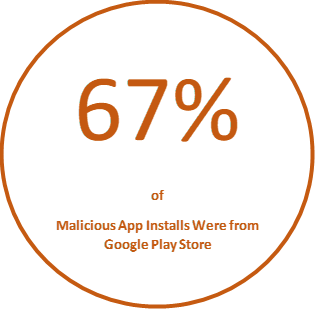
Mobile learning was once an oddball pedagogy in the eLearning landscape. But it didn’t stay that way after the smartphones came along. It emerged as a flexible and cost-effective solution for personalized learning.
A survey in 2016 named mobile learning A survey in 2016 named mobile learning as one of the top three learning priorities for businesses. Only ten percent of organizations were fully mobile-ready. While a 76% of them are only doing it in bits and pieces, 24% didn’t even delve into it.
Then came the pandemic, bursting everyone’s bubble. Organizations adopted a mobile-first approach as eLearning increased day by day.
Why didn’t they do that before the pandemic?
Mobile learning can go wrong if it’s not implemented right. Whether you’re new to a mobile platform or considering it, be mindful of a few implementation challenges.
Data Security
Data is a precious asset for any organization. An enormous amount of work goes into protecting it. Using personal devices for mobile learning can expose your data to cyber threats. These attacks usually happen in one of three ways.
- Third-Party Apps: Most apps don’t use secure connections to access data. That means both your user’s data and enterprise data are at risk. According to a 2020 study, sixty-seven percent of malicious app installs were from Google Play Store.

- A Mobile OS may not comply with security software: When your mobile device’s operating systems do not integrate with your IT security software, malicious files can infiltrate your organization’s network.
- Privacy: Securing personal devices can be tricky sometimes. Your employees may raise concerns regarding their privacy. We also hear stories about stolen and misplaced devices opening ways for mischievous tech geniuses to take control.
Tips to Overcome Security Threats
Like any other modality, mobile learning has its challenges. That shouldn’t stop you from adopting a BYOD policy or mobile learning altogether. With proper precautions and supervision, you can steer clear of harm’s way.
- Install genuine anti-malware programs to secure your devices and servers. Regular updates and firewall activations can fend off suspicious intrusions. Mobile tracking apps and remote wipe applications can be helpful in case of theft and misplaced devices.
- You must restrict content sharing privileges for your learners to protect copyrights and intellectual property rights. However, you can allow sharing reviews, comments, and expert opinions to facilitate collaborative learning.
- Most third-party apps access data using unsecure connections. A VPN serves as a low-cost protection against unencrypted connections. If you cannot restrict the use of third-party apps on the device, you can use a VPN to secure your connections.
- Consider log and monitor options to track and report on your learner’s activities. That way, you can diagnose when a malicious file creeps in and quickly secure your data.
- Make sure your learners understand the seriousness of security risks through security awareness training. Focus on simple measures like using strong passwords, not allowing others to handle your device, and remote blocking settings in case of theft.
Measuring your Learner's Data
Analyzing your learner’s data is crucial to prove the worth of an L&D initiative. Mobiles are independent platforms and learning can happen in both formal and informal ways. So, how will you know your mobile learning strategy is working?
How to Know if Your Strategy is Working
- Mobile responsive LMS: An LMS offers built-in analytics to measure your learner’s behavior and correlates it to your organization’s growth. LMS vendors have already resorted to configuring their platforms for mobile-friendly resolutions. Although an LMS can only report formal learning, it can give you a sense of accountability.
- Log Data Collection: Providing logging and monitoring options also helps you measure your learner’s data. Metrics like log activities, searched keywords, increased learning durations, and repeatedly accessed content can show your MLearning strategy’s effectiveness.
- Online Forums: Informal learning on mobile devices can happen from anywhere. Google searches, real-time experiences, social interactions, and even telephonic conversations. Encouraging your learners to contribute to online forums could be a sound approach to formalize informal content. You can evaluate your learners based on how many times they have contributed to a topic. It can also facilitate peer learning and create enthusiasm among your learners.
- Short Courses: Mobile learning can accommodate multiple modules like gamification, AR and VR simulation, and micro-learning. You can capture the data from leaderboards, badges, and completion rates to evaluate the results. Using these modules to deliver short courses can drive your learners to pursue courses on the LMS.
Small Screens
We usually prefer large screen spaces like laptops and desktops for our eLearning designs. Since mobiles have small screens, resolution issues are prevalent. While staring at those distorted images for more extended periods is no good for your eyes, trying to reconfigure them affects your time and resources too. Although millennials are accustomed to these small screens, their predecessors may find it challenging.
How to Beat it?
Resolution issues are a lot less evil than any other on this list because;
- LMS vendors are already customizing their resource pages to fit into your mobile screens.
- Mobile learning apps have always been about responsive sizes and formats.
- Mobile learning isn’t restricted to just handsets. You can prefer laptops, iPads, and other portable devices with proper battery backup.
- If you still need further customization, consult third-party service providers.
Finally
Mobile Learning is not a recent eLearning phenomenon, but we haven’t fully explored it until now. Although the future seems promising, there’s still room for innovation and development.
So, it’s too soon to say; whether mobile learning is eLearning’s fresh face or just another shade.
Whatever it may be, we must be ready to embrace and drive value from it.
Phenomecloud is a full-service technology company dedicated to helping clients solve business problems, improve the capability of their people, and achieve better results.




Leave a Comment